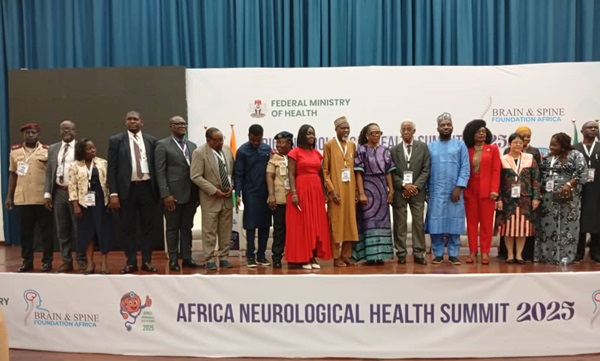…Declares brain health a national priority, integrates neurological services into key health systems

The Federal Government has launched a series of ambitious reforms to address Nigeria’s escalating burden of neurological and mental health conditions, aligning with global health targets and bridging critical care gaps across Africa.
The announcement came during the opening of the inaugural Africa Neurological Health Summit, held Tuesday in Abuja. The landmark event was co-hosted by the Federal Ministry of Health and Social Welfare and the Brain and Spine Foundation Africa.
In a keynote address, the Minister of Health and Social Welfare, Prof. Muhammad Pate – represented by the national coordinator of the Mental Health Awareness Programme, Dr. Tunde Ojo – described the summit as a pivotal shift in Nigeria’s health reform agenda.
“This summit marks a transition from conversation to coordinated execution. Neurological health is now a national priority, backed by policy, data and financing,” he said.
Pate announced the integration of neurological and mental health services into the Basic Healthcare Provision Fund (BHCPF), making essential care more accessible in underserved communities. Furthermore, relevant indicators will now be captured within Nigeria’s National Health Information Management System (NHMIS), enabling real-time tracking and evidence-based decision-making.
Following the passage of the Mental Health Act in 2021, Nigeria has developed a new National Mental Health Policy (2023) and adopted WHO’s mhGAP 3.0. Mental health services are now being mainstreamed across disease programs like HIV, Tuberculosis and Reproductive, Maternal, Newborn and Child Health (RMNCH).
The minister also highlighted a new tax incentive under the Presidential Initiative for Unlocking the Healthcare Value Chain. This policy includes targeted waivers on neuro-pharmaceutical products and raw materials, designed to improve affordability, stimulate local manufacturing and strengthen health supply chains.
A critical reform, he added, is the adoption of the sector-wide approach (SWAp), which ensures harmonisation of domestic and donor funding, technical assistance and planning for efficient service delivery – including neurological care.
At the sub-national level, state-level mental health desk officers are currently undergoing training to coordinate and manage neurological and mental health services, ensuring local ownership, sustainability and responsiveness.
Pate reaffirmed the government’s commitment to decriminalising attempted suicide, calling it a rights-based step toward compassionate and inclusive care.
“Neurological disorders are now the second leading cause of death globally and the leading cause of disability,” he said. “Conditions like stroke, epilepsy, migraine and dementia are causing devastating impacts, especially in low- and middle-income countries.”
He warned that nearly 80 per cent of people with epilepsy live in such countries, with treatment gaps often exceeding 75 per cent. “We must act decisively. This is not a federal challenge alone. We need the involvement of states, academia, civil society, professional bodies and the private sector.
The minister challenged participants to generate actionable strategies for prevention, diagnosis, treatment, rehabilitation and governance.
“Let this summit be remembered as the moment we declared brain health a continental priority and matched our words with action,” he said.
Delivering a keynote reflection, patron of the Brain and Spine Foundation Africa and president of the Nigerian Academy of Medicine, Prof. Samuel Ohaegbulam underscored the systemic neglect of neurological care in Nigeria.
He questioned whether neurosurgery is seen as a luxury in developing countries and recalled how public sector constraints led him to establish Memfys Hospital in Enugu, the only private hospital in West Africa accredited for neurosurgical training, producing 115 neurosurgeons without public funding.
“We must encourage mentorship, private sector participation and purpose-driven care,” Ohaegbulam said.
Former Minister of Women Affairs, Josephine Anenih stressed the importance of early detection of neurological disorders at the primary healthcare level. She called for PHCs to be equipped with diagnostic tools and trained staff to identify neurological conditions before they escalate.
She also advocated for the decentralisation of brain health services, integrating neurology into community-based frontline care, especially in rural areas.
Executive director of the Brain and Spine Foundation Africa and co-convener of the summit, Engr. Chika Okwuolisa delivered a personal testimony that moved many attendees.
“My journey didn’t begin in a boardroom. It began in an ICU. I watched my younger sister undergo five brain surgeries and suffer two strokes. That experience broke me, but it also moved me to act,” she said.
Okwuolisa lamented that millions of Africans live with treatable neurological conditions but remain neglected due to poverty, stigma and systemic failure. She listed conditions such as brain tumours, epilepsy, stroke, Alzheimer’s, Parkinson’s disease, spinal cord injuries, neuroinfections and neurodevelopmental disorders as devastating realities in many African homes.
“These conditions don’t just take lives, they destroy families. Brain health is not a luxury. It is essential to life,” she said.
She called on stakeholders to localise the goals of WHO’s Intersectoral Global Action Plan (IGAP) on neurological disorders by turning global policy into actionable African reform through investment, accountability and grassroots advocacy.
Since its inception in 2017, the Brain and Spine Foundation Africa has supported over 300 indigent patients with neurological interventions, hosted national conferences and facilitated hospital readiness assessments and rehabilitation workshops. It has also provided trauma counselling and established patient support networks.
“This summit is just the beginning. We must build a Nigeria – and an Africa – where no one dies or becomes disabled from a treatable neurological condition simply because they were poor or unheard,” Okwuolisa declared.
The summit ended with a unified call for urgent, time-bound commitments to transform neurological care into a core national health priority. Delegates from across Africa, along with global experts and advocacy groups working on brain and mental health, reaffirmed their dedication to the WHO-IGAP framework.
With neurological conditions now leading global causes of disability-adjusted life years (DALYs), stakeholders agree: the time for change is now.


